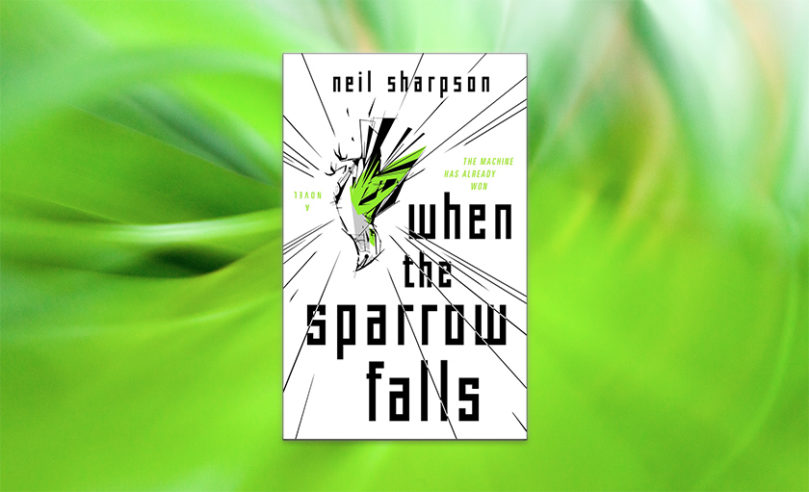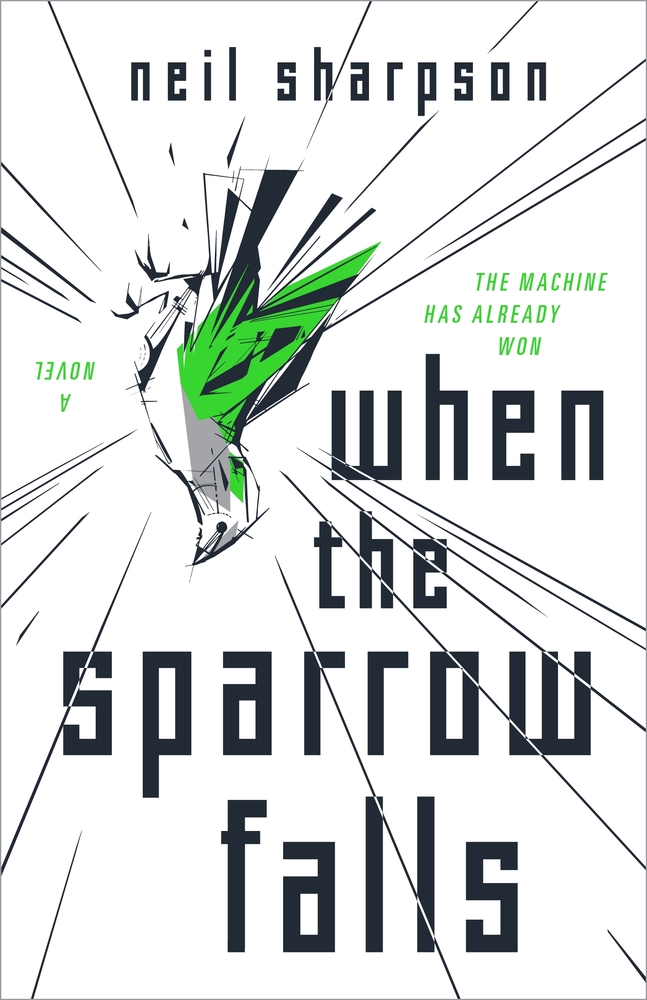Last year, Neil Sharpson’s darkly-funny yet touching novel, When the Sparrow Falls introduced the world to Agent Nikolai South, a man with two rules: Trust No One. And work just hard enough not to make enemies.
In the last sanctuary for the dying embers of the human race in a world run by artificial intelligence, if you stray from the path – your life is forfeit. But when a Party propagandist is killed – and is discovered as a “machine” – he’s given a new mission: chaperone the widow, Lily, who has arrived to claim her husband’s remains.
But when South sees that she, the first “machine” ever allowed into the country, bears an uncanny resemblance to his late wife, he’s thrown into a maelstrom of betrayal, murder, and conspiracy that may bring down the Republic for good.
When the Sparrow Falls illuminates authoritarianism, complicity, and identity in the digital age, in a page turning story that recalls Philip K. Dick, John le Carré and Kurt Vonnegut in equal measure.
Please enjoy this free excerpt of When the Sparrow Falls by Neil Sharpson, on sale in trade paperback on 5/10/22!
“Xirau’s dead?” I gasped.
“Oh, you knew him?” Niemann said, mildly. I caught the rebuke. Yes, Deputy Director, even I had heard of Paulo Xirau.
Everyone in the party knew Xirau. Anyone with ambition read his weekly column in The Caspian Truth, or at least claimed to. Nothing too challenging there. It was basically the same theme reiterated over and over. Once you had read one, you had read them all. Long, fiery, venomous diatribes against the Machine and its human chattel. Punishing stuff to read, even if you were aligned with his beliefs. I would have called them “jeremiads,” but that would have been unfair to a prophet who had at least a gift for vivid imagery. Xirau’s prose was a sledgehammer: dull, pounding and relentless. He died the most widely read writer in the whole country.
“Cause of death?” I asked. “Or is that the mystery?”
“Oh no, no,” said Niemann. “Believe me when I say that Mr. Xirau’s death is by far the least interesting thing about him.”
“You intrigue me, Deputy Director,” I said.
“Oh, I am glad,” said Niemann with, perhaps, just a touch of sarcasm.
I leafed through the file. A picture slipped out from between two pages: Xirau standing in a line of party functionaries in front of Mendelssohn’s hanging corpse. Every other man and woman there is looking away but not Xirau. Oh no, Xirau is staring up at him like an apostle, his eyes clear and bright.
I suppressed a shudder, and continued reading.
Xirau had not been born in the Caspian Republic. I hadn’t known that, but it was obvious in retrospect. No one is as fanatical as the recent convert. He had emigrated twenty years ago from Persia, and taken a low paying job in a cannery in Bonogady. I had met a few cannery workers in my time and some of them even had all their fingers. Not typically the kind of work one risks their life and leaves behind everything they’ve ever known for. While in the cannery, Xirau had penned some articles for the union newsletter, which had gotten him noticed by his bosses in the union, and, through them, the party. For a writer’s work to be circulated amongst the upper levels of the party was usually a precursor to them coming down with a rather permanent case of writer’s block, but not this time. Xirau was offered a position in The Truth (then viewed as a rather out of touch and elitist organ), and asked to bring his rough, authentic, working-class voice to the paper’s readers, who were left with nothing to do but wonder what they had done to deserve it.
From there, he had become the closest thing the modern party had to an intellectual voice, and when you had said that, you had said everything. I glanced back at that picture of Xirau at the hanging and remembered the tales of what he done there.
Xirau spitting on the corpse of Leon Mendelssohn. That was where we were, now.
That was the Caspian Republic.
“Did you read Xirau, South?” Niemann asked me.
“Occasionally,” I replied, warily.
“What did you think of him?” she said.
I felt insulted. She didn’t have to set the trap while I was looking right at her, that was just rude.
“He was a loyal party man,” I heard myself say.
“I’m loyal, South,” said Niemann with a furtive smile. “He was a bloody fanatic.”
I wanted to return the smile. But the Deputy Director of State Security could say such things, I could not.
“Do we believe that his political writing led to his death?” I asked. Xirau had been fond of darkly hinting that members of the party and the two main security agencies were in league with the Machine Powers. The party leadership encouraged this as it kept everyone on their toes. But maybe someone had found one of Xirau’s vague hints to be just a little too specific?
Niemann simply chuckled.
Irritated by her coyness, I skimmed ahead through the file until I reached the account of Xirau’s death. It was, as the deputy director had promised, depressingly anticlimactic.
Xirau had died in a bar fight.
Apparently he had tried to kiss a woman whose boyfriend had old-fashioned ideas about that sort of thing. “A case of mistaken identity” according to the file. A punch had been thrown and Xirau had cracked his head against a table and died almost instantly. Xirau’s killer, a man named Oleg Mansani, had a criminal record that was long but shallow: drunk and disorderly behavior, a few counts of assault, low-level hood work. It was considered unlikely that Xirau’s writings in The Truth were what led to his death, given that Mansani was borderline illiterate. Xirau’s death was exactly what it seemed. A sordid, bloody little accident. A life ending in a whimper.
I was starting to wonder why the deputy director was showing me this when I turned the page and a paragraph detailing the coroner’s findings jumped out at me like a bandit. I almost dropped the file in shock.
It was impossible. Of all people.
Niemann was grinning at me.
“He was an AI . . . ,” I muttered, to her or myself.
“He was.”
“A cloned body,” I said.
“Yes. Meaning that the man known as Paolo Xirau was a computer program. Part of the Infernal Machine, as he most likely would have put it himself,” Niemann replied.
I felt light-headed and my mind raced. If Xirau (Xirau!) could be Machine, then who else? How many were walking among us? Had they infiltrated StaSec? The parliament? Had we already lost?
No.
There were methods of detecting cloned bodies. High-ranking members of the party were regularly screened. I, in fact, had administered the test myself hundreds of times. You started with the teeth. Plaque and micro-cavities from a lifetime of eating food were difficult to fake. You then moved on to a spit sample, all the while engaging the suspect in casual conversation to find flaws in the accent or pronunciation of various words that might indicate that language had been implanted digitally rather than learned aurally.
These methods were fairly effective, though far from infallible. For “infallible,” you needed an autopsy. The reason Xirau had chosen to work in The Truth was, despite his fame and influence, he was still technically only a rank-and-file party member and not likely to be screened.
“A spy?” I asked. If not that, then what?
“Bloody terrible one if he was,” said Niemann. “The body was a civilian model. Xirau had been living here for a good twenty years. We have searched his rooms and there is not a shred of evidence he engaged in any espionage whatsoever. No subversive literature. No coded instructions. Nothing. It was the cleanest search I have ever undertaken. This Machine was a model human citizen.”
I took off my glasses and rubbed my eyes. They felt too large for my head, somehow.
“Let me see if I understand you,” I said. “Twenty years ago, a sentient computer program downloads itself into an off-the-rack cloned body. Emigrates to what is, for it, the most dangerous country in the world, and takes a low-paying job risking life and limb in a cannery before moving to the state newspaper where it writes tracts on the soulless, inhuman Machine of which it is secretly a part.”
“Told you he was interesting, didn’t I?” said Niemann with a grin. I did not share her good humor.
“What the hell was it thinking?” I wondered aloud.
“It doesn’t matter,” Niemann said, suddenly all business again.
“It doesn’t?” I said, incredulously.
“Not to you. Xirau was coded in a lab in Bonn and spent much of his life on an American server. He claimed both American and EU citizenship. They have jointly asked that his . . . wife be allowed to come here to Caspian and identify him.”
I stared at her.
“Wife?” I said at last.
“You heard me.”
“It had a wife?”
“It was a program who had a program that was programed to call itself his wife,” Niemann snapped irritably. “I don’t understand it, you don’t understand it, but then we are sane. Regardless, Parliament has agreed to this request.”
That shocked me more than anything I had heard today, and it had been a banner day.
“How is that possible?” I stammered. “The law—”
“Can be bent, overruled, interpreted imaginatively or, in extreme cases, simply ignored,” Niemann interrupted with a wave of her hand. “Xirau’s wife program, or rather widow program, is to be granted a special dispensation. It is to be considered an ‘honorary human.’”
This was insane. Gravity had reversed itself and the sun was setting in the east.
“Why would the party . . . ?” I began.
“You look very pale, South,” Niemann said.
I was the only black man in StaSec, and for a moment I thought she was making a joke.
“I’m sorry?”
“Did you have a hearty breakfast this morning? You look like you’re about to pass out.”
I had been certain when I stepped into the office that Niemann knew about my warning to Smolna. That might make anyone pale.
“No. I missed breakfast this morning.” A lie, technically, but my breakfast had been so meager that it didn’t feel like one.
“Tut tut, South. Most important meal of the day. I suppose the shops were out by the time you got there?”
“Yes,” I said, conscious that I was being drawn deeper into a lie.
“Was there a queue?”
“Yes.”
“We have it quite lucky here, you know,” Niemann said philosophically. “Outside the city restaurants have started charging people to rummage through their bins.”
I said nothing. Sanctions had been in place against the Caspian Republic for decades, but the hanging of Mendelssohn had evidently broken new ground in the Machine’s loathing for us. George, Confucius and Artemis rarely agreed on anything, but they had agreed that the Caspian Republic must starve, and Congress, the Standing Committee and the European Parliament had dutifully complied.
“Let’s not beat about the bush, South,” said Niemann. “The embargo is starting to bite and we’re all feeling it. Even me.”
At that I did something very dangerous. I actually snorted. Ridiculous. As if someone as high up in the party as Niemann could know hunger. What was that saying they had in Old Baku? What kind of party doesn’t have food?
Niemann glared at me, and I felt a bead of sweat roll down the back of my neck the size of a marble.
“Yes, even me, South,” she growled, barely above a whisper. And suddenly, I realized that she was right. There was a slackness to the skin of her face, a dry, dead quality to her hair.
The Deputy Director of State Security was starving. That was terrifying.
Niemann sighed and rubbed her eyes wearily. “It’s a gesture, South. Like a bouquet of flowers. Or a fucking white flag. We extend to Mrs. Xirau the best of Caspian hospitality and it may alter the Machine’s calculus. Maybe get them to loosen the noose around our necks just a smidgen.”
Like a dog. Punish it when it disobeys, reward it when it behaves. It was galling, but I was more hungry than galled. I had to wonder if Niemann was thinking clearly, however. Bringing an open, acknowledged AI into Caspian would be akin to wading through knee-high gasoline with a lit match.
“What about ParSec?” I asked.
“I don’t know, I don’t care and I don’t want you to do either,” Niemann snapped. “Our orders have come from Parliament. Mrs. Xirau gets the red carpet. You are to be her escort.”
So. There it was at last. The reason I had been summoned to her office. And I felt like I was going to be sick.
“Me?” I said, hoping I had misheard her.
“No, the fucking lamp. Yes, you, South,” said Niemann testily.
My skin was crawling. A machine was coming here. To Caspian. A computer program walking around in a cloned human body, a stumbling corpse with a rictus smile. The very idea terrified and repulsed me.
Niemann continued.
“You will escort Mrs. Xirau during her time in Caspian. You will ensure she follows her prescribed itinerary and does not deviate from it in the slightest.”
She produced a third file from her desk and pushed it across to me. This one contained instructions and protocols for “Mrs. Xirau’s” visit, which I was dismayed to discover was scheduled for tomorrow morning. Evidently, things were moving very fast.
“You will obviously prevent her from engaging in any kind of espionage or subversion,” said Niemann. “You will not allow her to speak to any citizen. You will keep her on a short leash. A very short leash, South. Understood?”
I felt a sudden, desperate urge to resign.
“Understood,” I said, wanly.
I waited to be dismissed, but the command never came.
Niemann said nothing for a few seconds, as if carefully choosing her words. When she spoke again, it was softer, almost conspiratorial.
“It’s dangerous work, South,” she said at last. “I’d advise you to remember that.”
I knew that tone of voice. It was the voice of a good neighbor who says I think you have an admirer when she saw a man from ParSec watching you from across the street the night before.
A voice that warned as much as it was safe to warn.
“Deputy director . . . ,” I said softly. “This . . . this is aboveboard? It has been cleared?”
“It has been cleared,” said Niemann. “But what has been cleared may be muddied. ParSec have a way of rewriting history. And then it’s time for questions. Difficult questions, South, to which there are no right answers.”
Something Olesya had once said to me now resurfaced in my memory.
“When the party orders you to break the law, who do you obey? The party or the law?” Niemann continued.
“Should the worst happen, I will try to protect you as best as I can. That’s as much as I can give you.”
More than I expected.
I nodded.
Suddenly, Niemann was herself again.
“I believe we’re done here. Good day South,” she said dismissively and gestured for me to leave.
I took both files; the one for Paulo Xirau and the one pertaining to his wife, and rose to leave. I stopped at the door.
“Deputy director? What is its name?” I asked.
“Hm?” Niemann muttered distractedly, not looking up from her work.
“Xirau’s widow?”
Niemann furrowed her brow, as if she had forgotten. Then, it came to her.
“Lily,” she said. “Its name is Lily.”
Copyright © Neil Sharpson 2021
Order When the Sparrow Falls Here













Comments are closed.
Leave a Reply